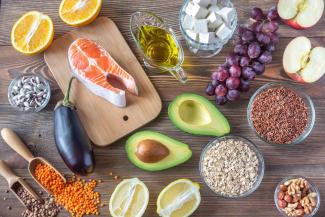Lower Your Cholesterol Naturally: Tips from a Registered Dietitian

Cholesterol, a fatty substance found in your blood, is essential for various bodily functions. However, too much of it can pose serious health risks, including heart disease and stroke. While medication can help manage high cholesterol levels, making lifestyle changes, particularly in your diet, can significantly impact your cholesterol levels. As a registered dietitian, I'm here to share some valuable insights and tips on how to lower your cholesterol naturally through dietary choices.
Understanding Cholesterol: Before delving into ways to lower cholesterol, it's essential to understand the two main types: LDL (low-density lipoprotein) and HDL (high-density lipoprotein). LDL cholesterol is often referred to as "bad" cholesterol because high levels can lead to plaque buildup in arteries, increasing the risk of heart disease. Conversely, HDL cholesterol is known as "good" cholesterol as it helps remove LDL cholesterol from the bloodstream, reducing the risk of heart disease.
Now, let's explore some dietary strategies to help lower your cholesterol levels naturally:
- Incorporate Heart-Healthy Fats: Not all fats are created equal. While saturated and trans fats can raise LDL cholesterol levels, monounsaturated and polyunsaturated fats can help lower LDL cholesterol and raise HDL cholesterol levels. Foods rich in these heart-healthy fats include avocados, nuts, seeds, avocado oil, and olive oil. Aim to replace saturated fats, such as those found in butter and red meat, with healthier alternatives to support heart health.
- Increase Soluble Fiber Intake: Soluble fiber acts like a sponge in the digestive system, binding to cholesterol and carrying it out of the body. Foods high in soluble fiber include oats, barley, legumes, fruits (such as apples, oranges, and berries), and vegetables (such as Brussels sprouts and broccoli). Try to add these foods into your meals and snacks to help lower LDL cholesterol levels naturally.
- Choose Lean Protein Sources: Opt for lean protein sources such as poultry, fish, tofu, and legumes instead of fatty cuts of meat. Fish, particularly fatty fish like salmon, mackerel, and trout, are rich in omega-3 fatty acids, which can help lower triglycerides and reduce the risk of heart disease. It’s recommended to include fish in your diet at least twice a week for maximum benefits.
- Limit Processed Foods and Added Sugars: Processed foods, especially those high in refined carbohydrates and added sugars, can contribute to elevated LDL cholesterol levels and increase the risk of heart disease. Minimize your intake of sugary snacks, sugary beverages, and processed foods like cookies, cakes, and pastries. Instead, focus on whole, minimally processed foods to support overall health and lower cholesterol levels.
- Embrace Plant-Based Eating: A plant-based diet rich in fruits, vegetables, whole grains, legumes, nuts, and seeds can have significant benefits for heart health. Plant-based foods are naturally low in saturated fat and cholesterol and high in fiber, antioxidants, and other heart-healthy nutrients. Consider incorporating more plant-based meals into your diet by experimenting with vegetarian or vegan recipes.
Lowering your cholesterol naturally through dietary changes is a proactive step towards improving your heart health and reducing the risk of cardiovascular disease. By incorporating heart-healthy fats, soluble fiber, lean proteins, whole foods, and plant-based options into your diet, you can positively impact your cholesterol levels and overall well-being. Remember, consistency is key, so make gradual changes and celebrate your progress along the way. As always, consult with a registered dietitian or healthcare provider for personalized guidance tailored to your individual needs and health goals. Here's to a heart-healthy lifestyle!
